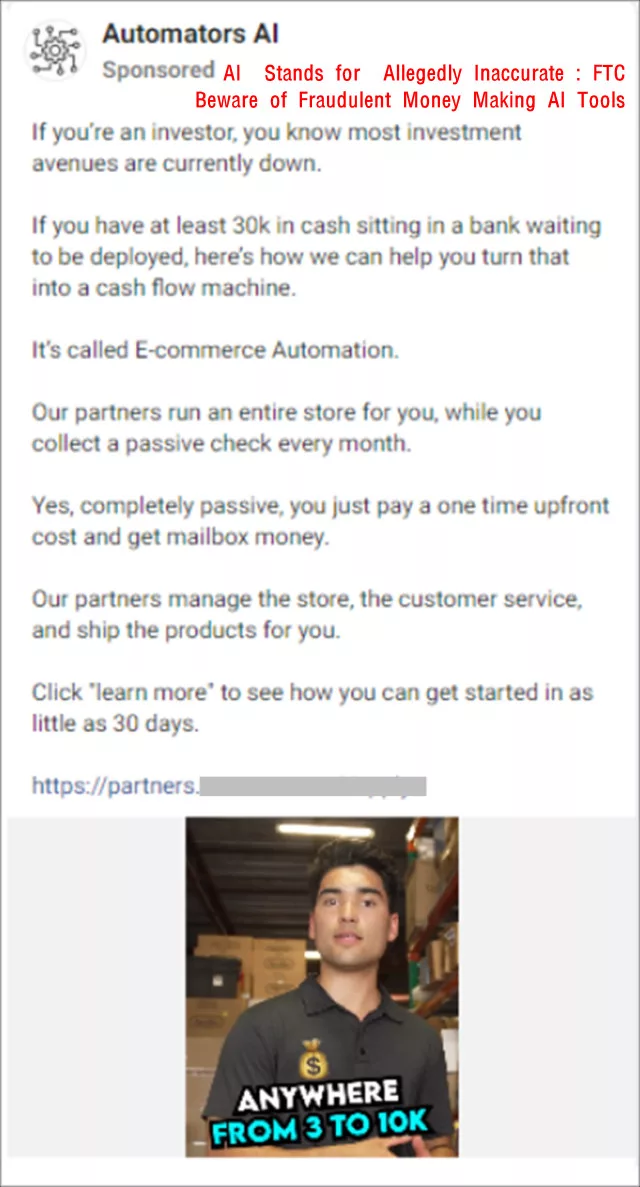
Automators AI complaint exhibit
“AI” Stands for “Allegedly Inaccurate”: FTC
The Federal Trade Commission (FTC) has charged that defendants Automators AI (formerly known as Empire Ecommerce and Onyx Distribution), Roman Cresto, John Cresto, and Andrew Chapman have violated the Business Opportunity Rule and the FTC Act by – among other things – making misleading earnings claims, often couched in terminology du jour. The lawsuit also alleges the defendants have used illegal contract clauses in an effort to squelch customer complaints, in violation of the Consumer Review Fairness Act.
According to the FTC, through both Automators AI and the previous companies, the defendants have promoted themselves as ecommerce experts and self-made millionaires who have helped thousands of consumers make big bucks by running third-party stores on platforms like Amazon, Walmart, and Facebook. Through websites, videos, email, and social media, the defendants have made eye-popping claims about what their clients have made and what others can expect to make – for example, “$4k-$6k consistently monthly net profit” and “597k in 8 months.” The FTC says the defendants bolster those representations by touting their purported use of artificial intelligence, claiming the company “integrates AI machine learning into the automation process, resulting in increased revenue and margins.” The defendants also allegedly lure people in with testimonials from supposedly satisfied customers. According to one endorser, “[M]y store has been able to do $1 million dollars in revenue in the past 4 months alone.”
The complaint alleges the defendants offered consumers an array of “automated packages” for an initial investment of between $10,000 to $125,000. The FTC says the defendants’ representatives further claimed that the stores they managed were delivering monthly profit margins between 8% and 20%, due in part to the “AI machine learning” they used to maximize revenues.
Even after the defendants reconfigured their operations under the Automators AI name, the FTC says the money-making claims continued. According to one social media post, “Our partners run an entire store for you, while you collect a passive check every month. Yes, completely passive, you just pay a one time upfront cost and get mailbox money.” They also introduced a “coaching” program that for thousands more would supposedly show people how to “use AI or chatgpt tools” to “scale an Amazon store to 10k a month and beyond.”
That’s the picture the defendants drew for consumers, but the FTC says it’s far from the truth. According to the complaint, “By June 2022, less than 10 percent of the stores that [the defendants] managed for its clients were active and generating sales, and by October 2022, most of those stores were suspended or terminated” for violating Amazon’s policies. Furthermore, the FTC alleges that the majority of the Walmart.com stores the defendants tried to open – often after their Amazon stores were suspended – were never activated or were terminated for various policy violations.
The FTC says the defendants were well aware of consumers’ dissatisfaction. According to the company’s head of customer service, they routinely received numerous complaints from people reporting that they were losing money because their stores weren’t performing as advertised. Rather than give refunds, the FTC says the defendants typically offer purchasers a “remedy” in the form of another ecommerce store in a different marketplace. But first, the defendants allegedly require them to sign an agreement that includes a clause that threatens “legal action” if customers “disparage or otherwise harm the other Party’s reputation, goodwill, or commercial interests.” According to the FTC, the upshot for consumers who have sunk their savings with the defendants is that many of them are now saddled with significant financial losses.
In addition to alleging Section 5 violations, the FTC says the defendants have violated the Business Opportunity Rule by – among other things – making misrepresentations about income or profits, failing to furnish prospective buyers with the disclosure document mandated by the Rule, making earnings claims without providing other required information, and failing to include required information in general media ads. The FTC also alleges that the defendants’ form contracts violate the Consumer Review Fairness Act by restricting people’s ability to offer their honest opinions about their dealings with the defendants.
A federal court in California has temporarily halted the operations of Automators AI. But even at this early stage, the case offers three important pointers for other companies.
Conduct a Business Opportunity Rule compliance check. In addition to the FTC Act’s prohibition on deceptive or unfair practices, the Business Opportunity Rule includes legally enforceable dos and don’ts for covered companies. Your first step: Read the Rule to see if you meet the definition of a “business opportunity.” Next, review your marketing materials – including videos, social media posts, and other ways you communicate with potential customers – to make sure you’re complying with all the requirements of the Rule. Looking for more information?
Substantiate all claims related to earnings, profits, or other financial benefits. It’s FTC 101 that before making any objective product claim, advertisers need to have solid proof in hand that supports what they say. That legal fundamental applies with full force to money-making representations. Don’t make claims if you don’t have appropriate substantiation. Don’t cite cherry-picked results or best-case scenarios. And don’t rely on hope or hyperbole.
Read your form contracts and delete provisions that violate the Consumer Review Fairness Act. The Consumer Review Fairness Act protects people’s ability to share their honest opinions about a business’s products, services, or conduct. Using contract provisions to squelch those rights violates the law. (Courtesy: FTC)
